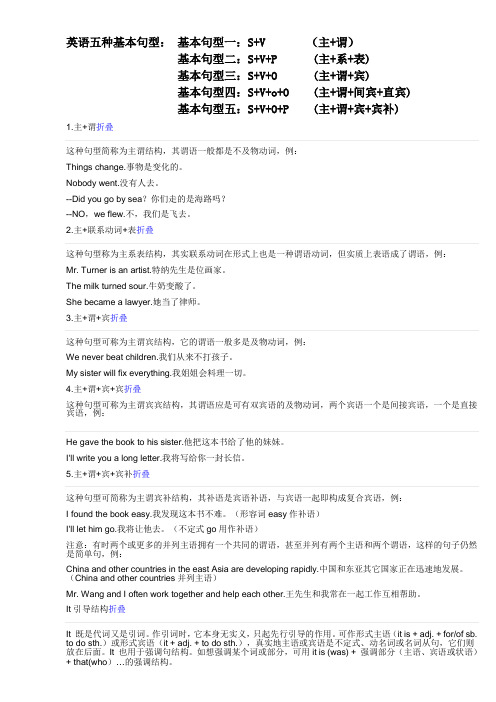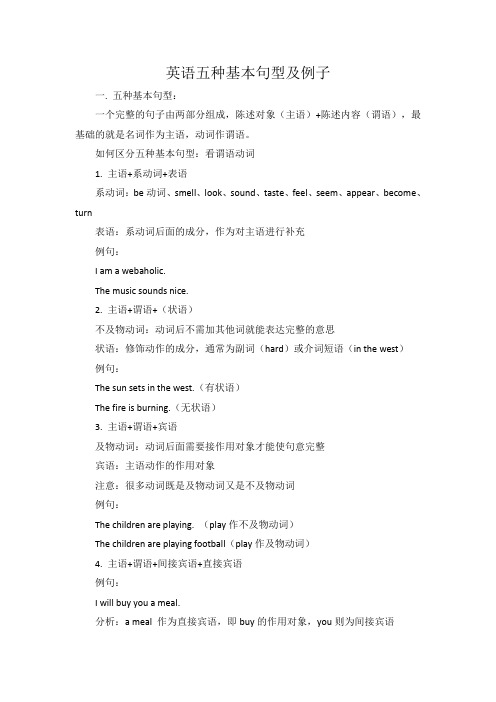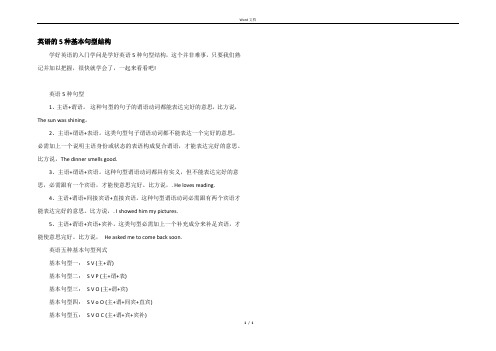英语五种基本句型
英语五种基本句型

英语五种基本句型:基本句型一:S+V (主+谓)基本句型二:S+V+P (主+系+表)基本句型三:S+V+O (主+谓+宾)基本句型四:S+V+o+O (主+谓+间宾+直宾)基本句型五:S+V+O+P (主+谓+宾+宾补)这种句型简称为主谓结构,其谓语一般都是不及物动词,例:Things change.事物是变化的。
Nobody went.没有人去。
--Did you go by sea?你们走的是海路吗?--NO,we flew.不,我们是飞去。
这种句型称为主系表结构,其实联系动词在形式上也是一种谓语动词,但实质上表语成了谓语,例:Mr. Turner is an artist.特纳先生是位画家。
The milk turned sour.牛奶变酸了。
She became a lawyer.她当了律师。
这种句型可称为主谓宾结构,它的谓语一般多是及物动词,例:We never beat children.我们从来不打孩子。
My sister will fix everything.我姐姐会料理一切。
4.主+谓+宾+宾折叠这种句型可称为主谓宾宾结构,其谓语应是可有双宾语的及物动词,两个宾语一个是间接宾语,一个是直接宾语,例:He gave the book to his sister.他把这本书给了他的妹妹。
I'll write you a long letter.我将写给你一封长信。
这种句型可简称为主谓宾补结构,其补语是宾语补语,与宾语一起即构成复合宾语,例:I found the book easy.我发现这本书不难。
(形容词easy作补语)I'll let him go.我将让他去。
(不定式go用作补语)注意:有时两个或更多的并列主语拥有一个共同的谓语,甚至并列有两个主语和两个谓语,这样的句子仍然是简单句,例:China and other countries in the east Asia are developing rapidly.中国和东亚其它国家正在迅速地发展。
英语五种基本句型

Exercise
1. He is studying. 主语 谓语 2. The teachers love us. 主语 谓语 宾语 3. You showed us your photos. 主语 谓语 间宾 直宾 will ask me to jump. 4. Tom will ask me to jump. 主语 谓语 宾语 宾补 5. They can sing well. 主语 谓语 状语
英 语 五 种 基 本 句 型
1. 主语 + 系动词 + 表语 2. 主语 + 谓语 3. 主语 + 谓语 + 宾语 4. 主语 + 谓语 + 间宾 + 直宾 5. 主语 + 谓语 + 宾语 + 宾补
五种基本句型
1. 主语 系动词 表语 (SVC) 主语+系动词 表语: 系动词+表语
He is a student. His face turned red. The apple tastes sweet. The soldier keeps still.
分 析 句 子 结 构
1. His father is a good cook.
主系表
2. She is watering the flowers. 主谓宾 3. You can sing and dance. 主谓 4. We will buy him a book. 5. These books are good. 6. Jack wants me to dance. 7. She has an old car. 8. It’s my duty to help you. 主谓双宾 主系表 主谓宾宾 主谓宾 主系表
英语五大基本句型

• 1)You should keep the room clean and tidy. 你应该让屋子保持干 净整洁。(形容词) 2) We made him our monitor.(名 词)我们选他当班长。 3) His father told him not to play in the street.(不定式)他父亲告诉他 不要在街上玩。 4)My father likes to watch the boys playing basketball.(现在分词)
S
基本句型 三 S +V +O (主+谓+宾) 共同特点是:谓语动词都具有实义, 都是主语产生的动作,但不能表达 完整的意思,必须跟有一个宾语, 即动作的承受者,才能使意思完整。 这类动词叫做及物动词。
• 这种句型中的动词一般为及物动词, 所谓 及物动词,就是这种动词后可以直接接 宾语,其宾语通常由名词、代词、动词 不定式、动名词或从句等来充当。
• 这种句型主要用来表示主语的特点、身 份等。其系动词一般可分为下列两类: (1)表示状态。这样的词有:be, look, seem, smell, taste, sound, keep 等。如: 1) This kind of food tastes delicious.这种食物吃起来很可口。 2) He looked worried just now.刚 才他看上去有些焦急。
a delicious meal.
9.John sent
a new watch. a dictionary. nothing. my pictures. a hand. how to run the machine. some flowers.
基本句型 五 S +V +O +C (主+谓+宾+宾补) 共同特点是:动词虽然是及物动 词,但是只跟一个宾语还不能表 达完整的意思,必须加上一个补 充成分来补足宾语,才能使意完 整。
英语五种基本句型及例子

英语五种基本句型及例子一. 五种基本句型:一个完整的句子由两部分组成,陈述对象(主语)+陈述内容(谓语),最基础的就是名词作为主语,动词作谓语。
如何区分五种基本句型:看谓语动词1. 主语+系动词+表语系动词:be动词、smell、look、sound、taste、feel、seem、appear、become、turn表语:系动词后面的成分,作为对主语进行补充例句:I am a webaholic.The music sounds nice.2. 主语+谓语+(状语)不及物动词:动词后不需加其他词就能表达完整的意思状语:修饰动作的成分,通常为副词(hard)或介词短语(in the west)例句:The sun sets in the west.(有状语)The fire is burning.(无状语)3. 主语+谓语+宾语及物动词:动词后面需要接作用对象才能使句意完整宾语:主语动作的作用对象注意:很多动词既是及物动词又是不及物动词例句:The children are playing. (play作不及物动词)The children are playing football(play作及物动词)4. 主语+谓语+间接宾语+直接宾语例句:I will buy you a meal.分析:a meal 作为直接宾语,即buy的作用对象,you则为间接宾语含有两个宾语的为双宾语5. 主语+谓语+宾语+宾语补足语宾语补足语:对宾语进行补充,使句意更完整例句:We elected John our chairman.(我们选了John为主席)John为宾语,our chairman对John进行补充宾语和宾补结合起来叫做复合宾语。
五大英语基本句型

英语语法五大基本句型英语句子是由主语(subject), 谓语动词(verb),宾语(object), 表语(predicative),状语(adverbial),宾语补足语(object complement)等成分组成,按照这些成分的组合方式英语句子可分为五种基本句型。
S:Subject(主语)V:Verb(动词)O:Object(宾语)IO:Indirect Object(间接宾语)DO:Direct Object(直接宾语)P:Predictive(表语)OC: Object Complement(宾语补足语)1句型一:S+V 主语+不及物动词不及物动词本身就可以表达完整的意念,不需要宾语及补语,但有时可有副词,介词短语等状语修饰语。
e.g. The rain stopped .The old man walks in the park .句型一的扩展:1.主语+不及物动词+状语e.g. The machine works smoothly. (机器运转正常。
)2.There +不及物动词+主语e.g. There is some milk in the bottle .There comes the bus .3. 主语+不及物动词+ 动词不定式e.g. They stopped to take a short rest . (他们停下来稍作休息) 注意动词stop 可用作不及物动词,也可用作及物动词。
作不及物动词时, 通常后接动词不定式,表示停下来的目的是做另一件事。
作及物动词时,通常后接动名词,表示停止做这件事。
e.g. They stopped taking a rest .2句型二:S+V+P 主语+系动词+表语系动词本身不能表达完整的意念没,需要形容词,名词,介词短语等来补充说明主语,也叫主语补语。
e.g. My sister is a nurse .I feel quite hungry .The ball is under the desk .3句型三:S+V+O 主语+及物动词+宾语及物动词本身需要一个动作的接受者(宾语),才可以表达一个完整的意念。
英语五种基本句型

英语的五种基本句型1. Subject (主语) +Verb (谓语)这种句型中的动词大多是不及物动词,这些动词常见的有:appear, apologize,arrive, come, die, disappear, exist, fall, happen, rise,等等。
如:The students work very hard.学生们学习很努力。
She apologized to me again. 她再次向我道歉。
The accident happened yesterday evening.事故是昨天晚上发生的。
2. Subject (主语) +Link. V(系动词) +Predicate(表语)这种句型中的系动词一般可分为下列两类:(1)表示状态的连系动词。
这些词有:be, look, seem, appear, smell, taste, sound, keep, remain, 等等。
如:Several players lay flat on the playground.几个队员平躺在操场上。
We should remain modest and prudent any time.我们在任何时候都应该保持谦虚谨慎。
This kind of food tastes terrible.这种食物吃起来很糟糕。
The picture looks more beautiful at a certain distance.这幅画在一定的距离看更漂亮一些。
(2)表示转变或结果的系动词。
这些词有:become, get, grow, turn, go, come, prove,等等。
如:Spring comes. It is getting warmer and warmer.春天到了,天气变得越来越暖和。
Don't have the food. It has gone bad.不要吃那种食物,已经变质了。
英语的5种基本句型结构

Word文档英语的5种基本句型结构
学好英语的入门学问是学好英语5种句型结构,这个并非难事,只要我们熟
记并加以把握,很快就学会了,一起来看看吧!
英语5种句型
1、主语+谓语。
这种句型的句子的谓语动词都能表达完好的意思,比方说,
The sun was shining。
2、主语+谓语+表语。
这类句型句子谓语动词都不能表达一个完好的意思,
必需加上一个说明主语身份或状态的表语构成复合谓语,才能表达完好的意思。
比方说,The dinner smells good.
3、主语+谓语+宾语。
这种句型谓语动词都具有实义,但不能表达完好的意
思,必需跟有一个宾语,才能使意思完好。
比方说,. He loves reading.
4、主语+谓语+间接宾语+直接宾语。
这种句型谓语动词必需跟有两个宾语才
能表达完好的意思。
比方说,. I showed him my pictures.
5、主语+谓语+宾语+宾补。
这类句型必需加上一个补充成分来补足宾语,才
能使意思完好。
比方说,He asked me to come back soon.
英语五种基本句型列式
基本句型一:S V (主+谓)
基本句型二:S V P (主+谓+表)
基本句型三:S V O (主+谓+宾)
基本句型四:S V o O (主+谓+间宾+直宾)
基本句型五:S V O C (主+谓+宾+宾补)
1/ 1。
英语5种基本句型

英语5种基本句型根据英语句子中谓语动词的结构形式变化,这种结构形式的多样性决定了不同谓语动词的特性,由此,我们可以将英语句子划分为五种基本类型,即五种基本句型。
一. Subject (主语) +Verb (谓语)此句型的句子有一个共同特点,即句子的谓语动词都能表达完整的意思。
这种句型中的动词基本上都是不及物动词,这些动词常见的有:appear, apologize,arrive, come, die, disappear, exist, fall, happen, rise,等等,但可以在其后添加修饰成分,如副词,介词短语,甚至状语从句作状语。
如:Time flies.(主语+谓语)The moon rose.月亮升起来了。
(主语+谓语)Birds sing beautifully.(副词)They stayed in a hotel. (介词短语)She apologized to me. 她再次向我道歉。
I had left when they came.(时间状语从句)二.Subject (主语) +Link. V(系动词) +Predicate(表语)此句型的句子有一个共同的特点:句子谓语动词都不能表达一个完整的意思,必须加上一个表明主语身份或状态的表语,才能表达完整的意思。
系动词主要包括:A)be动词。
如am,is are,was,were.如:He is clever.She is a beautiful girl.B)除了be 系动词外,还有一些动词也可以用作系动词,1)表感官的动词。
如:feel, smell, taste, sound, look等。
如:This kind of cloth feels soft.That flower smells good.The food tastes delicious.That piece of music sounds beautiful.He looks ill today.2)表变化和结果的动词。
- 1、下载文档前请自行甄别文档内容的完整性,平台不提供额外的编辑、内容补充、找答案等附加服务。
- 2、"仅部分预览"的文档,不可在线预览部分如存在完整性等问题,可反馈申请退款(可完整预览的文档不适用该条件!)。
- 3、如文档侵犯您的权益,请联系客服反馈,我们会尽快为您处理(人工客服工作时间:9:00-18:30)。
英语五种基本句型意义:英语的句式与中文的不同。
我们在学习英语的时候要注意到这个点。
有的同学在学习中对此没有充足的理解,常常受中文的干扰。
在写作中表现出不能写出准确的句子。
I. 什么是句子?长的是句子,短的是词。
无论字数多少,只要有主语和谓语(动词),而且能表达完整的意义的一句话就是一个句子。
I am tired.Pressing one’s palm together and resting one’s head on the back of one’s hand while closin g the eyes as if sleeping means“I am tired.”____________________________________________________________________”)这两个句子都具备了___语和____语。
都是完整的句子。
要记住:在英语中,一个句子必须且只能有一个谓语。
1. 省略主语的句子Come in, please. (______)Open the door.What a day! (What ____ _____ _____ ______ _____!)2. 一个句子不能同时有两个谓语。
典型错误:1) The old man likes take a walk in the village after supper.∟2) I enjoy talk with him over a cup of coffee.∟3) The boy ran to his mother cry.∟4) After write the notice, he put it up on the wall.∟3. 不要把从句的谓语当成句子的谓语, 或把主句的谓语当成从句的谓语。
如果是一个复合句,主句和从句都应该分别有自己的主语和谓语。
典型错误:1)1)Those who eat too much will easily ill.∟2) When he walking in the park, he felt a little tired.∟3)When I at school, I studied very hard.∟II. Practice:判断以下是否是句子。
1.Birds can fly2.The birds in the cage which I bought yesterday3.Wait for me at the station4. If you know how to play with words to make people laugh5. A way of saying “I’m sorry”6. Patting the stomach before a meal7. The bread my mother makes is much better than what you can buy at the store.8. To make friends in the school which was not far from my new home9. If you want to know what it feels like to fall through the air, take off in a rocket, fly a helicopter or fight alien creatures in outer spaceIII. 常见的句子结构因为英语动词种类的不同,构成了不同的句子类型。
和中文不同的是,英语的动词分为及物动词和不及物动词。
表达同一个意思时,有的是及物动词,有的就是不及物动词。
如:表示“听” 这个意义时,_______ 是不及物动词;_________是及物动词。
表示“看” 这个意义时,__________是不及物动词,_______ watch和notice就是及物动词。
表示“到达”,_________是不及物动词,__________是及物动词。
不及物动词是不能接宾语的。
只能加上一个介词,才能接宾语。
如:listen ____, look _____, arrive ______等等。
1. 主语+ 不及物动词e.g. He came in.The airplane from Hong Kong _______ (到达) at four p.m.How did the accident ________(发生)?Australia has ______(改变)a lot in the past forty years.2. 主语+ 系动词+ 表语常见的系动词有:be, seem, appear, become, go, get, grow, turn,look, sound, feel, taste, smelle.g. She _____ very happy. (×She very happy.)We ______ proud of our friends.It ______ useless trying to argue with him.I _______ caught in the traffic.He _______ (似乎)to have misunderstood you.3. 主语+ 及物动词+ 宾语e.g. We learn English at school.He wondered whether Bill had managed to escape.I didn’t mean to be so rude.4. 主语+ 及物动词+ 间接宾语+ 直接宾语有些动词需要接两个宾语。
间接宾语一般由人担任,直接宾语一般由物担任。
give, offer, teach, tell, read, ask, bring, pass, lend, return, write, throw, allow, send,costmake, buy, do, get, save, cook, sing, find等。
e.g. My brother gave me a book.Who sent you the computer?这样的句子变为被动时可根据需要,将任何一个宾语作为句子的主语。
e.g. ___________________________________________________________________.5. 主语+ 及物动词+ 宾语+ 宾补e.g. Unfortunately they find it difficult to repay this money.The growth in population made New York the largest city in the USA.【模拟试题】改错练习:1. Please speak louder so that everybody can listen you.2. Great changes have been taken place in my hometown.3. Listen! Someone knocking at the door.4. He told me don’t call him before 9 o’clock.5. Does your parents allow you make your own decision?6. Although it is only August, but the weather is getting worse daily.7. Because the professor had fallen ill, so he was not able to be present at the conference.8. In Japan, a person sees the “OK” gesture may think it means money.9. When I past his room, I heard him singing an English song.翻译练习:(一)1李明学习很努力。
2.事故是昨天下午发生的。
3春天就要来了.4我们住在这个城市已相关10年了.5学生们学习很努力。
6 她再次向我道歉。
(二)1.这是本英汉辞典。
2.午餐的气味很好。
3.他堕入了情网。
4. 一切看来都不同了。
5.他长得又高又壮。
6.麻烦的是他们缺少钱。
(三)1. 谁知道答案?2. 她微笑表示感谢。
3. 他拒绝帮他们的忙。
4.他喜欢看书。
5. 他们吃了剩饭。
6.他说:“早上好!”(四)1. 她给自己定了一套新衣裳。
2.她给丈夫煮了一顿美味的饭。
3.他给你买了一本字典。
4. 他对她什么都不拒绝5.我给他看我的照片。
6.我洗了我的汽车。
(五)1.他们任命他当经理。
2.他们把门漆成绿色。
3. 这使得他们要细想一想。
4.他们发现那房子无人居住。
5. 他怎么会这样想?6.我们送他出去。
参考答案:(一)1.Li Ming works very hard.2.The accident happened yesterday afternoon3.Spring is coming.4.We have lived in the city for ten years.5.The students work very hard.6.She apologized to me again.(二)1. This is an English-Chinese dictionary.2. The dinner smells good.3. He fell in love.4. Everything looks different.5. He is growing tall and strong.6. The trouble is that they are short of money.(三)1. Who knows the answer?2. She smiled her thanks.3. He has refused to help them.。
4. He enjoys reading.5. They ate what was left over.6. He said "Good morning."(四)1. She ordered herself a new dress.。
2. She cooked her husband a delicious meal.3. He brought you a dictionary.4. He denies her nothing.5. I showed him my pictures.6. I gave my car a wash.(五)1. They appointed him manager. 2. They painted the door green. 3. This set them thinking.4. They found the house deserted.5. What makes him think so?6. We saw him out.参考答案【试题答案】1. listen→hear2. 去掉been3. ∧knocking → is knocking4. don’t → not to5. ∧make →to make6. 去掉but7. 去掉so 8. ∧sees→who sees9. past → passed或∧past → w alked past。
